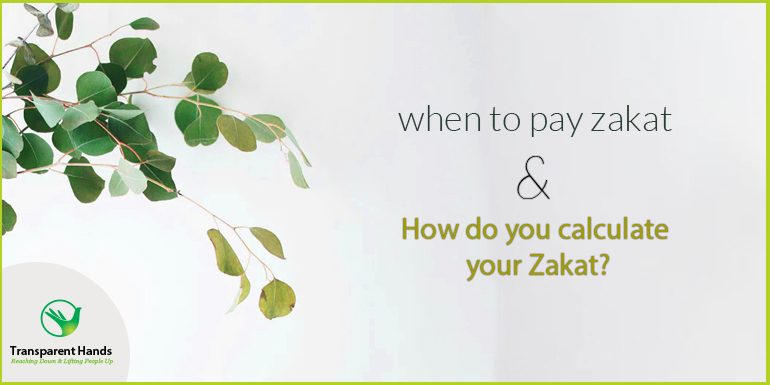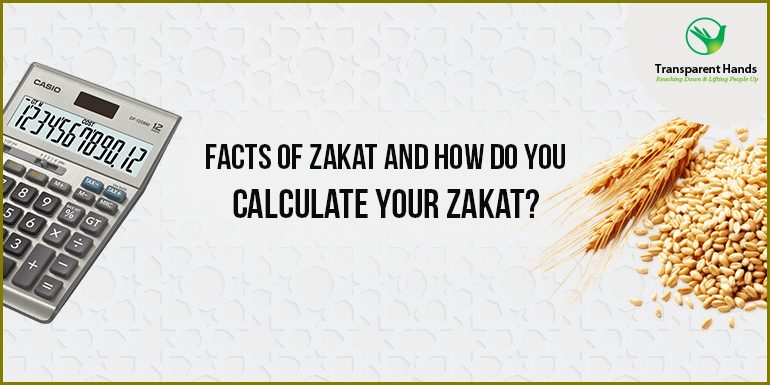When to Pay Zakat and how do you calculate your Zakat

Islam is not only a religion but a way of life too. It preaches about good practices in day to day life and forbids conducting any evil acts which may hurt any individual, family or the community. Islam has only one motto that is maintaining harmony and peace in society. This motto in Islam has led to the practice of giving Zakat to the poor in order to maintain social justice. When to Pay Zakat and how do you calculate your Zakat.
Our dear Prophet Muhammad (SM) has mentioned Zakat as the bridge of Islam. He said: “Zakat is the bridge of Islam; so whoever performs it can cross the bridge and whoever withholds it will be detained beneath it. And it (Zakat) extinguishes the anger of the Lord.”- (Bihar al-Anwar, Volume 74, Page 405).
Every sincere Muslim who believes in the Almighty and the day of resurrection should perform this duty from the heart and with pleasure. It is an obligation which a Muslim owes to Allah and the society.
When to pay Zakat:
Zakat should be paid once in every year. It’s due on every lunar year or Hijiri or from the day your wealth exceeds the nisab amount. You can also count your Zakat anniversary from the date you last paid Zakat. For many the conversions between the Gregorian and Hijri Calendar become confusing. You can also use Gregorian and Hijri Date online converters to find out when your one lunar year cycle has completed.
The calculation will differ slightly based on the kind of Calendar you are using. If you follow the Gregorian calendar you will have to pay 2.557% of your net worth. If you follow the Hijri calendar, use 2.5% of your net worth.
-> Facts of Zakat and How do you Calculate Your Zakat
Many people are stuck with the misconception that Zakat can only be paid during the sacred month Ramadan which is not right. Zakat is an annual duty and so you can pay it at any time of the year after your wealth has exceeded the Nisaab amount.
Ramadan is a sacred time when Muslims fast from dawn to dusk and reads the Quran. During this period giving Zakat or charity is absolutely a noble deed and the giver will gain more rewards as promised by the Almighty. Nobody should confuse the voluntary charity or giving during the month of Ramadan with the mandatory giving in Islam which is Zakat.
How do you calculate your Zakat?
Nisab is cut-off amount. When your personal wealth is above the Nisaab amount you will be eligible to pay Zakat. If your wealth is below the Nisab amount , you do not owe Zakat. Nisaab is calculated based on the cash value equivalent of 3 ounces (87.48 grams) of gold or 21 ounces (612.36 grams) of silver. Calculating Nisaab is simple. If the current rate of silver is $15 then the Nisaab amount will be ($15 X 21 ounces = $315). If your personal wealth is above $315, you owe Zakat.
It is always wise to use the value of silver because most of us can exceed the Nisaab amount because the market value of silver is less than that of gold. This will ensure that more Zakat recipients are helped therefore more well to do families should pay Zakat.
If you have any loans from the bank calculate its monthly installments and then multiply by 12 to know your annual liability. Calculate your credit card debts as well. Also calculate your monthly expenses like rents, bills and tuition fees of children etc. Calculate all your assets excluding those you use for your everyday life like your primary residence, car, clothes and business equipment because they are not eligible for Zakat. In the next step deduct the total amount of your liabilities and expenses from your Zakatable assets. If the net worth of your Zakatable assets is $5000 then you’ll give $125 for Zakat ($5000X 2.5% = $125).
Conclusion
Giving Zakat is so important in Islam that it has been mentioned at 82 places in the Qur’an in close connection with prayer. An important Hadith has been narrated by a woman Asma who said that the Prophet (PBUH) once said to her “Do not withhold your money, (for if you did so) Allah would with-hold His blessings from you.” – (Sahih Bukhari, Volume 2, Book 24, and Number 513).
From the above mentioned Hadith it is clear that one cannot get Allah’s mercy if he acts like a miser. If you do not show kindness to the poor or unfortunate you cannot expect to get the blessings of the Almighty. Nobody has ever become poor by giving. So open your folded hands and carry out the mandatory duty which has been bestowed upon you by the Almighty himself. Give Zakat to purify your soul and wealth and contribute to social Justice. Let’s lead our lives on the righteous way and let the unfortunate ones to live with human dignity.











Leave a Reply